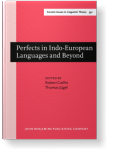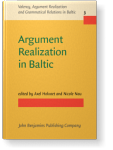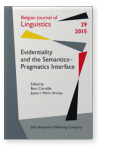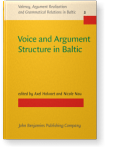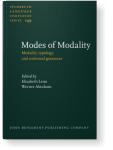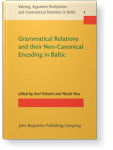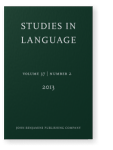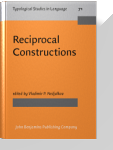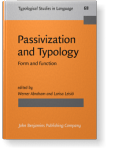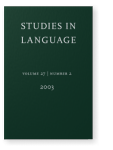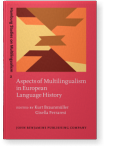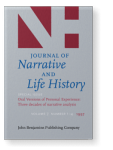Björn Wiemer
List of John Benjamins publications for which Björn Wiemer plays a role.
2020 Chapter 5. Perfects in Baltic and Slavic Perfects in Indo-European Languages and Beyond, Crellin, Robert and Thomas Jügel (eds.), pp. 123–214 | Chapter
This survey presents a comprehensive account of perfect constructions (based on an anteriority participle and an often optional auxiliary) in Baltic and Slavic over space and time, including dialects and high-contact minority varieties. Based on a classification by participle types and their… read more
2016 Contexts for the choice of genitive vs. instrumental in contemporary Lithuanian Argument Realization in Baltic, Holvoet, Axel and Nicole Nau (eds.), pp. 259–332 | Article
Modern Lithuanian is characterized by variation in the coding of core and peripheral arguments, as these can, in specific circumstances, be marked with either the genitive or the instrumental case (=gen-ins alternation). This alternation occurs in some contexts that can be generalized fairly well,… read more
2015 Evidentiality and the semantics-pragmatics interface: An introduction Evidentiality and the Semantics-Pragmatics Interface, Cornillie, Bert and Juana I. Marín-Arrese (eds.), pp. 1–18 | Article
2015 Converse relations with the reflexive marker in Lithuanian and Polish: Between grammar and lexicon Voice and Argument Structure in Baltic, Holvoet, Axel and Nicole Nau (eds.), pp. 211–286 | Article
This paper discusses the various methodological and theoretical prerequisites necessary to cope with a seemingly quite simple task. This task consists in establishing the number and types of verb pairs in Lithuanian and Polish which are morphologically related by the presence vs. absence of the… read more
2015 On conditions instantiating tip effects of epistemic and evidential meanings in Bulgarian Evidentiality and the Semantics-Pragmatics Interface, Cornillie, Bert and Juana I. Marín-Arrese (eds.), pp. 161–192 | Article
The article deals with tip effects between evidential and epistemic components in the meaning potential of evidential markers in Bulgarian, the focus being on sentential adverbs with inferential functions. We justify (and start with) the following assumptions: (i) for any unit we should… read more
2014 Mora da as a marker of modal meanings in Macedonian: On correlations between categorial restrictions and morphosyntactic behaviour Modes of Modality: Modality, typology, and universal grammar, Leiss, Elisabeth and Werner Abraham (eds.), pp. 127–166 | Article
The article presents a semasiological case study of the Macedonian modal mora, which derives from the common South Slavic modal verb morati ‘must’, and its collocation with the morpheme da, which is the probably most prominent non-factivity marker of Macedonian used in a broad variety of syntactic… read more
2014 On the non-canonical marking of the highest-ranking argument in Lithuanian and Icelandic: Steps toward a database Grammatical Relations and their Non-Canonical Encoding in Baltic, Holvoet, Axel and Nicole Nau (eds.), pp. 301–361 | Article
This paper is a first report on an ongoing project aiming at building up a database of non-canonical argument marking in Lithuanian in contrast to other languages with relatively rich systems of morphological cases. The language with which we begin the comparison is Icelandic. The overarching aim… read more
2007 11. Reciprocal and reflexive constructions in Polish Reciprocal Constructions, Nedjalkov, Vladimir P. (ed.), pp. 513–559 | Chapter
2007 10. Reciprocal and reflexive constructions in German Reciprocal Constructions, Nedjalkov, Vladimir P. (ed.), pp. 455–512 | Chapter
2006 Relations between Actor-demoting devices in Lithuanian: Dedicated to Emma Geniusiene Passivization and Typology: Form and function, Abraham, Werner and Larisa Leisiö (eds.), pp. 274–309 | Article
This article is devoted to a systematic account of Lithuanian Actor-demoting devices, both grammatical (with participles, only to a limited extent by the reflexive marker) and lexical (by the reflexive marker), and their interplay in the contemporary language. Occasional comparisons with Latvian… read more
2003 Östen Dahl & Maria Koptjevskaja-Tamm (eds.): "Circum-Baltic Languages" Studies in Language 27:2, pp. 361–395 | Review article
2003 Dialect and language contacts on the territory of the Grand Duchy of Lithuania from the 15th century until 1939 Aspects of Multilingualism in European Language History, Braunmüller, Kurt and Gisella Ferraresi (eds.), pp. 105–143 | Article
